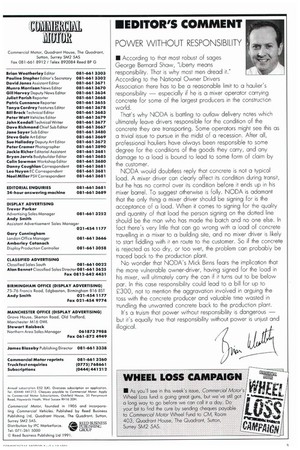IIEDITOWS COMMENT
Page 5

If you've noticed an error in this article please click here to report it so we can fix it.
POWER WITHOUT RESPONSIBILITY
• According to that most robust of sages George Bernard Shaw, "Liberty means responsibility, That is why most men dread it." According to the National Owner Drivers Association there has to be a reasonable limit to a haulier's responsibility — especially if he is a mixer operator carrying concrete for some of the largest producers in the construction world.
That's why NODA is battling to outlaw delivery notes which ultimately leave drivers responsible for the condition of the concrete they are transporting. Some operators might see this as a trivial issue to pursue in the midst of a recession. After all, professional hauliers have always been responsible to some degree for the conditions of the goods they carry, and any damage to a load is bound to lead to some form of claim by the customer.
NODA would doubtless reply that concrete is not a typical load. A mixer driver can clearly affect its condition during transit, but he has no control over its condition before it ends up in his mixer barrel. To suggest otherwise is folly. NODA is adamant that the only thing a mixer driver should be signing for is the acceptance of a load. When it comes to signing for the quality and quantity of that load the person signing on the dotted line should be the man who has made the batch and no one else. In fact there's very little that can go wrong with a load of concrete travelling in a mixer to a building site, and no mixer driver is likely to start fiddling with it en route to the customer. So if the concrete is rejected as too dry, or too wet, the problem can probably be traced back to the production plant.
No wonder that NODA's Mick Binns fears the implication that the more vulnerable owner-driver, having signed for the load in his mixer, will ultimately carry the can if it turns out to be below par. In this case responsibility could lead to a bill for up to 300, not to mention the aggravation involved in arguing the toss with the concrete producer and valuable time wasted in trundling the unwanted concrete back to the production plant.
It's a truism that power without responsibility is dangerous — but it's equally true that responsibility without power is unjust and illogical.












































































































